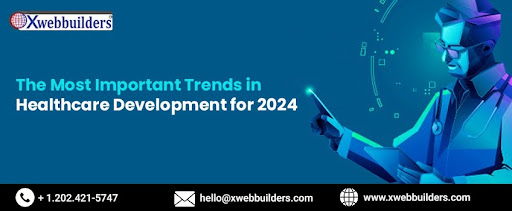
September 01, 2025

The healthcare industry is experiencing a remarkable transformation driven by technological advancements, changing patient expectations, and the need for more efficient and effective healthcare services. As we approach 2024, several key trends are poised to shape the landscape of healthcare development. These trends have the potential to revolutionize patient care, improve outcomes, and enhance the overall healthcare experience. One of the most prominent trends in healthcare mobile app development for 2024 is the continued integration of artificial intelligence (AI) and machine learning (ML) technologies. AI and ML have already demonstrated their capabilities in various healthcare applications, from diagnosis and treatment planning to patient monitoring and personalized medicine. In 2024, AI and ML will further expand their impact, assisting in early disease detection, optimizing treatment strategies, and enabling more precise and efficient healthcare interventions.
Another significant trend is the widespread adoption of telehealth and remote patient monitoring. The COVID-19 pandemic accelerated the acceptance and utilization of virtual healthcare services, and this trend is expected to continue in 2024. Telehealth platforms and remote monitoring devices will enable patients to access healthcare services remotely, improving accessibility and convenience while reducing the burden on healthcare facilities. Additionally, any mobile app development company can agree that Blockchain technology is also set to play a crucial role in healthcare development in 2024. Its secure and decentralized nature makes it ideal for managing health data, ensuring privacy, and facilitating interoperability. Blockchain will enhance data security, enable seamless sharing of patient information, and contribute to improved care coordination and research collaborations.
Moreover, precision medicine and genomics will gain further momentum in 2024. Advances in genomic research will lead to more targeted therapies, personalized treatment plans, and better outcomes for patients. The integration of genomics and precision medicine will enable healthcare providers to tailor treatments based on an individual's genetic makeup, optimizing efficacy and minimizing adverse reactions. The Internet of Medical Things (IoMT) is another trend that will continue to grow in importance in 2024. IoMT devices, including wearables, connected medical equipment, and sensors, will facilitate real-time data collection, remote patient monitoring, and intelligent healthcare systems. These devices will enable proactive disease management, preventive care, and data-driven insights for healthcare providers.
As digital health technologies become increasingly prevalent, cybersecurity and data privacy will remain critical concerns in 2024. Healthcare organizations will invest in robust security measures to protect patient data from cyber threats and ensure compliance with privacy regulations. Apart from it, our mobile app development company in Ashburn USA has listed other upcoming trends:
1) Artificial Intelligence and Machine Learning: Artificial intelligence (AI) and machine learning (ML) technologies are revolutionizing healthcare by enhancing diagnostics, treatment plans, and patient care. In 2024, AI and ML will continue to play a pivotal role in disease detection and prediction, aiding in the early diagnosis of conditions such as cancer, cardiovascular diseases, and neurodegenerative disorders. These technologies will also optimize treatment strategies, assist in personalized medicine, and improve patient monitoring systems through the analysis of vast amounts of data, leading to more precise and efficient healthcare interventions.
2) Telehealth and Remote Patient Monitoring: The COVID-19 pandemic accelerated the adoption of telehealth and remote patient monitoring, and these trends are set to become integral to healthcare delivery in 2024. Telehealth services will continue to expand, enabling patients to access medical consultations, follow-ups, and preventive care remotely. Remote patient monitoring devices, wearable technologies, and digital health platforms will empower patients to actively participate in their own healthcare management, allowing healthcare providers to monitor vital signs, track treatment progress, and intervene proactively.
3) Blockchain for Health Data Management: Blockchain technology offers a secure and decentralized platform for managing health data, ensuring privacy, interoperability, and data integrity. In 2024, blockchain will witness increased utilization in healthcare to streamline medical record management, enable secure sharing of patient data across providers, and facilitate research collaborations. Blockchain will enhance data security, reduce administrative burdens, and empower patients to have more control over their health information, leading to improved care coordination and better patient outcomes.
4) Precision Medicine and Genomics: Advancements in genomics and personalized medicine are reshaping healthcare practices. In 2024, precision medicine will gain further momentum, with genomics playing a critical role in tailoring treatments to an individual's unique genetic makeup. Precision medicine approaches will enable targeted therapies, reduce adverse drug reactions, and optimize treatment efficacy. Additionally, advancements in gene editing technologies like CRISPR will hold promise for treating genetic disorders and transforming the landscape of healthcare.
5) Internet of Medical Things (IoMT): The Internet of Medical Things (IoMT) refers to the integration of medical devices and healthcare systems with internet-connected technologies. In 2024, IoMT will witness significant growth, enabling remote patient monitoring, real-time data collection, and intelligent healthcare infrastructure. IoMT devices, including wearables, implantable sensors, and connected medical equipment, will enhance disease management, enable preventive care, and improve treatment outcomes through continuous monitoring and data-driven insights.
6) Cybersecurity and Data Privacy: With the increasing reliance on digital health technologies, cybersecurity and data privacy will remain key concerns in 2024. Healthcare organizations will prioritize robust security measures to protect patient data from cyber threats and unauthorized access. Stricter regulations and compliance standards will be implemented to ensure data privacy, requiring organizations to adopt advanced encryption techniques, regular vulnerability assessments, and proactive cybersecurity strategies to safeguard sensitive health information.
The healthcare trends anticipated for 2024 may have a mixed impact on cost. While some trends could potentially increase healthcare expenditures, others have the potential to reduce costs and improve efficiency. It is important to consider the specific context and implementation of these trends to determine their impact on healthcare costs. On the other hand, the expansion of telehealth and remote patient monitoring may increase accessibility and convenience for patients, but it may also require investments in technology infrastructure and ongoing maintenance. Additionally, depending on the healthcare system and insurance coverage, there may be variations in reimbursement rates for telehealth services, which could impact the cost for patients and healthcare providers.
As we look ahead to 2024, the healthcare industry stands at the forefront of innovation and transformation. The trends discussed in this article are poised to reshape the landscape of healthcare development and bring about significant advancements in patient care, treatment efficacy, and healthcare delivery. Artificial intelligence and machine learning technologies will continue to revolutionize healthcare by enabling early disease detection, optimizing treatment plans, and improving patient monitoring systems. Telehealth and remote patient monitoring will become integral components of healthcare services, offering convenience, accessibility, and proactive healthcare management.
Blockchain technology will enhance data security, privacy, and interoperability, facilitating seamless sharing of patient information and driving collaborations across healthcare providers. Precision medicine and genomics will unlock personalized treatment options based on an individual's genetic makeup, leading to more targeted therapies and improved patient outcomes. The Internet of Medical Things (IoMT) will connect devices, wearables, and medical equipment, enabling real-time data collection, remote monitoring, and data-driven insights for healthcare providers. However, cybersecurity and data privacy will remain critical areas of focus to safeguard patient information and maintain trust in digital healthcare systems. For more information, visit Xwebbuilders.com .